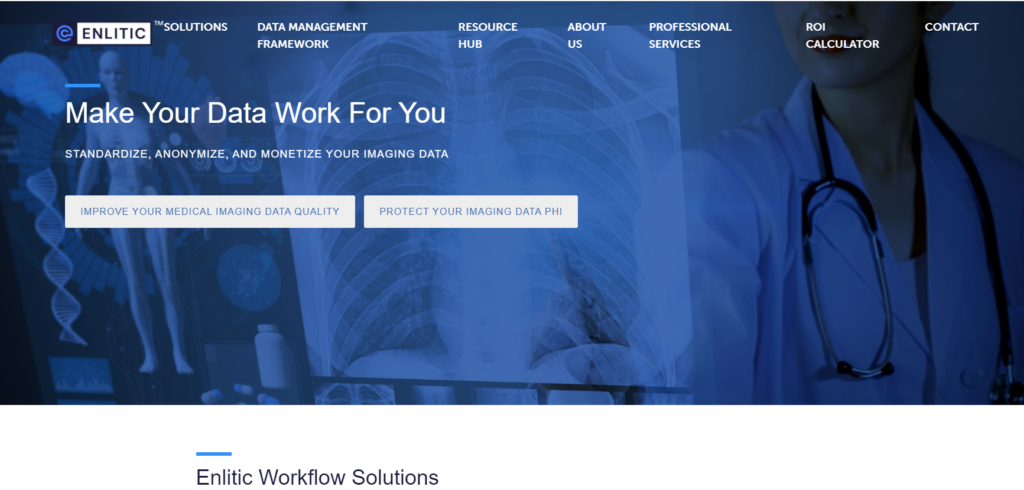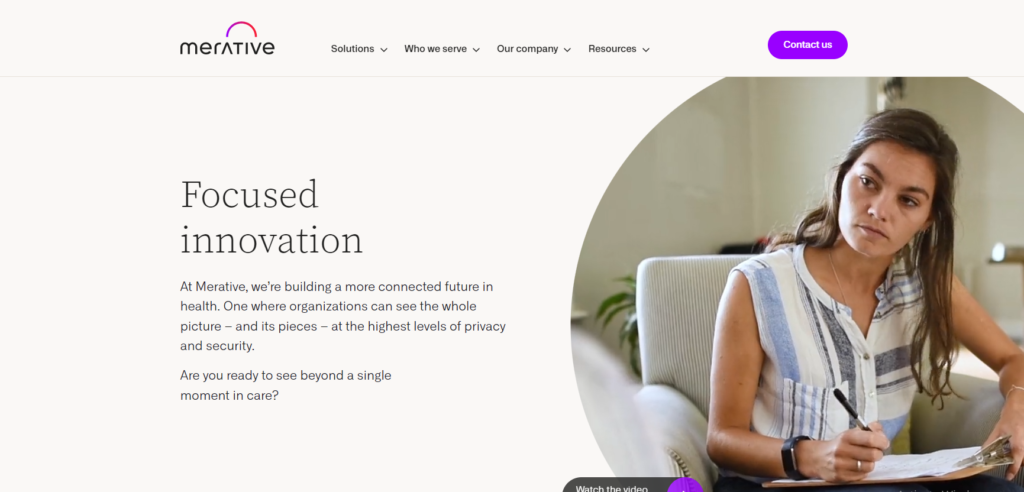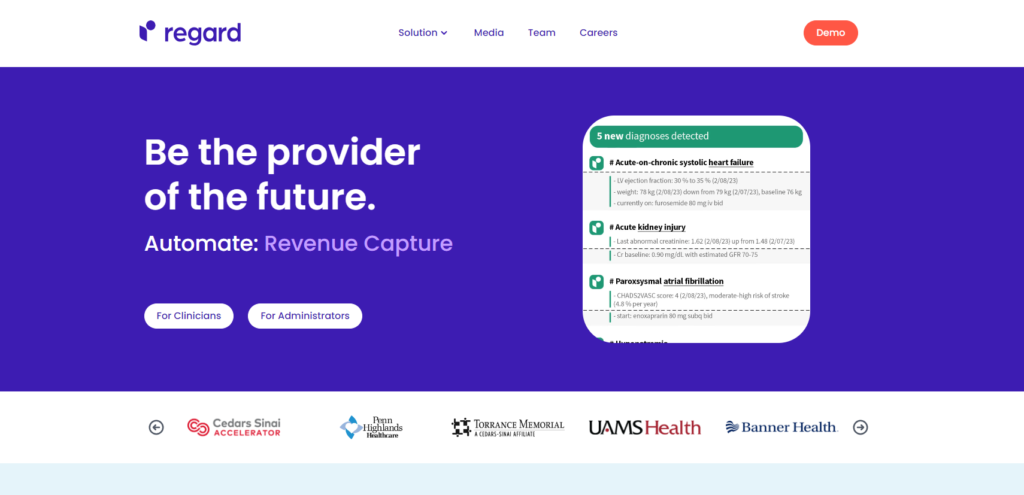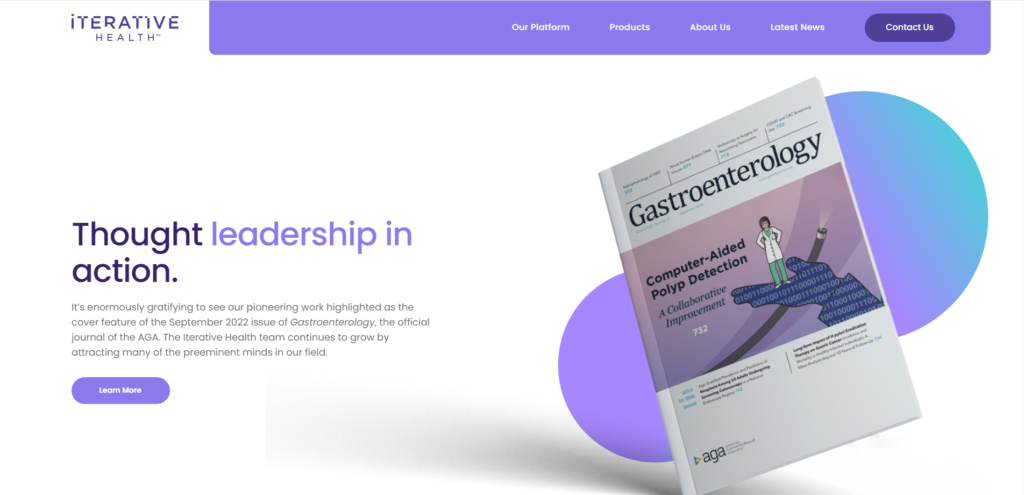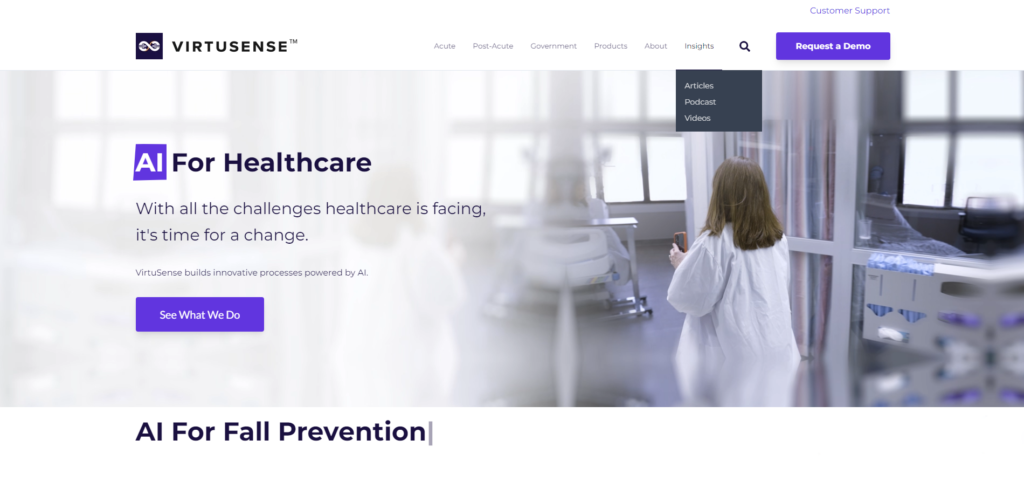Looking for top AI healthcare software for 2024? Discover leading AI solutions revolutionizing healthcare.
Explore The Top 10 AI Tool For Healthcare Industry
Top 10 AI Tools for Healthcare
| Top 7 AI tools | Best For | Key Strength |
|---|---|---|
| Enlitic | Managing medical imaging data | Reduce mundane data routing tasks for PACS administrators |
| Merative | Clinical decision support and healthcare analytics | Treatment cost calculator provides real-time estimates of costs |
| Regard | Automating clinical tasks | Reduce clinician burnout |
| Freenome | Early cancer detection | Potential to save lives |
| Iterative Health | Detection of gastrointestinal (GI) diseases | Improves the accuracy and consistency of endoscopy readings |
| VirtuSense | Predictive fall prevention | Automated and fast alerting system ensures timely response from staff |
| Vize.ai | Visual AI Applications | Real-time decision support |
AI healthcare software is rapidly transforming the medical sector, offering professionals innovative tools to enhance patient care, diagnosis, and treatment.
By leveraging machine learning and data analytics, AI healthcare software analyzes patient data, predicts outcomes, and personalizes treatment plans. These AI-powered tools help reduce medical errors, improve efficiency, and save lives. In this review, we explore the best AI healthcare software available and how they are revolutionizing healthcare delivery.
1. Enlitic
Best for Managing Medical Imaging Data
Enlitic is a leading AI healthcare software company that utilizes deep learning technology to analyze medical imaging data. Its advanced platform employs machine learning algorithms to assist radiologists in interpreting images with greater accuracy, resulting in quicker diagnoses and better patient outcomes. Enlitic’s software aids in detecting abnormalities in X-rays, MRIs, CT scans, and other medical images, enabling healthcare providers to make more informed decisions about patient care.
2. Merative
Best for Clinical Decision Support and Healthcare Analytics
Merative, formerly known as IBM Watson Health, offers AI-driven health and wellness solutions. Their offerings span personalized medicine, population health management, and clinical decision support tools.
3. Regard
Best for Automating Clinical Tasks
If you need an AI healthcare solution that integrates smoothly with electronic medical record (EMR) systems, consider Regard.
Regard enhances clinical documentation improvement (CDI) teams by automating routine tasks. This allows teams to focus on complex charts, leading to a significant return on investment for the healthcare system. Automation reduces burnout and enables physicians to concentrate on non-repetitive work.
4. Freenome
Best for Early Cancer Detection
Freenome, a biotechnology company, innovates cancer detection using multiomics—a blend of genomics, proteomics, transcriptomics, and other molecular data—to identify cancer early when it’s most treatable.
Leveraging AI, Freenome detects early cancer signs via blood tests. Their technology analyzes molecular patterns in blood samples to offer personalized health insights and recommendations for timely intervention.
5. Iterative Health
Best for the Detection of Gastrointestinal (GI) Diseases
Iterative Health focuses on integrating AI and precision medicine to advance the detection and treatment of gastrointestinal diseases. Using AI and computer vision, the company enhances the precision and reliability of endoscopy assessments, aiming to set a higher standard in gastrointestinal care. Patients benefit from personalized treatment plans that consider their genetic profile, lifestyle, and disease specifics, potentially enhancing the efficacy of treatments.
6. VirtuSense
Best for Predictive Fall Prevention
VirtuSense is an AI healthcare technology company that specializes in motion analysis and fall prevention solutions for seniors. Their technology utilizes sensors and AI to monitor changes in movement patterns and prevent falls proactively.
VirtuSense offers three distinct products:
– VSTAlert: Predictive monitoring to preemptively identify potential falls.
– VSTBalance: Provides precise assessments of fall risks.
– VSTOne: An intelligent automation hub for hospitals, facilitating proactive fall identification and optimizing nursing workflows.
7. Viz.ai
Best for Visual AI Applications
Vize.ai is an advanced AI platform that specializes in visual recognition and image classification. Designed to cater to businesses and developers, Vize.ai provides powerful tools for integrating sophisticated visual AI capabilities into various applications. Vize.ai features an intuitive, no-code platform that simplifies the creation, training, and deployment of custom image classifiers.
How to Choose the Best AI Healthcare Software for Your Business
When selecting AI healthcare software, start by considering your company’s specific healthcare focus, as no single tool fits all needs. Budget is also crucial, as many of these tools can be costly.
Choose a solution with a proven track record for accuracy and reliability, ensuring it comes from reputable providers. Verify that the software complies with industry regulations and standards to guarantee patient data privacy and security.
Lastly, take advantage of free trials or demos to test the software and confirm it meets your requirements before making a final decision.
What are the benefits of using AI in Healthcare?
1. Improved Diagnosis and Treatment
- Accurate Diagnoses: AI can analyze medical images, lab results, and patient data to provide more accurate and early diagnoses.
- Personalized Treatment Plans: AI algorithms can tailor treatment plans to individual patients based on their unique medical histories and conditions.
2. Enhanced Patient Care
- Predictive Analytics: AI predicts patient outcomes and potential complications, allowing for proactive care and intervention.
- Remote Monitoring: AI-powered tools enable continuous monitoring of patients’ health, facilitating timely medical responses.
3. Increased Efficiency
- Automation of Routine Tasks: AI automates administrative tasks such as scheduling, billing, and record-keeping, freeing up medical staff to focus on patient care.
- Streamlined Workflows: AI optimizes operational workflows in hospitals and clinics, reducing wait times and improving patient throughput.
4. Reduction in Medical Errors
- Error Detection: AI systems can detect and alert healthcare providers to potential errors in medication, treatment plans, and patient records.
- Clinical Decision Support: AI assists clinicians by providing evidence-based recommendations and highlighting critical patient information.
5. Enhanced Research and Development
- Drug Discovery: AI accelerates the drug discovery process by analyzing large datasets to identify potential new treatments and predict their efficacy.
- Clinical Trials: AI optimizes the design and management of clinical trials, improving participant selection and monitoring.
6. Cost Savings
- Operational Efficiency: By automating routine tasks and optimizing workflows, AI reduces operational costs in healthcare facilities.
- Preventive Care: AI-driven predictive analytics can reduce hospital admissions and readmissions by enabling preventive care, ultimately lowering healthcare costs.
7. Patient Engagement and Satisfaction
- Virtual Assistants: AI-powered chatbots and virtual assistants provide patients with 24/7 support, answering questions and managing appointments.
- Personalized Communication: AI tailors communication and education materials to individual patients, enhancing their understanding and engagement in their own care.
8. Enhanced Data Management
- Data Integration: AI integrates and analyzes data from various sources, providing comprehensive insights into patient health and improving decision-making.
- Data Security: Advanced AI algorithms help protect sensitive patient information by identifying and mitigating security threats.
Conclusion
The integration of AI in healthcare brings significant benefits, including improved diagnosis and treatment, enhanced patient care, increased efficiency, reduced medical errors, and substantial cost savings. By leveraging AI technologies, healthcare providers can deliver more personalized, accurate, and efficient care, ultimately leading to better patient outcomes and overall healthcare advancements.

